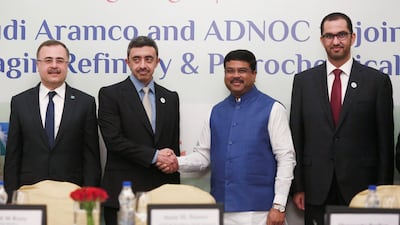State-owned Abu Dhabi National Oil Company (Adnoc) and Saudi Aramco signed an agreement to jointly invest in a $44 billion refinery on the west coast of India, the companies said on Monday.
Aramco, which in April signed an agreement to jointly develop the 1.2 million barrel per day Ratnagiri refining and chemicals complex in the western Indian state of Maharashtra with a group of Indian refiners, will share its stake with Adnoc, making it the first such agreement between the two energy companies.
"By investing in this project, we will both secure off-take of our crude to a key market for Adnoc, as well as strengthen access in one of the world’s largest and fastest growing refining and petrochemical markets," said Sultan Ahmed Al Jaber, UAE State Minister and Adnoc Group chief executive.
Abu Dhabi, which accounts for 4.5 per cent of the world's oil production, much of it through Adnoc, has increasingly shifted towards building more downstream capacities, both at home and abroad. The UAE is expected to spend Dh400bn over the next five years in the downstream sector as well as in developing Abu Dhabi's sour gas reserves. The Indian refinery investment also comes on the heels of Adnoc's own commitment to spend Dhs165bn with partners in developing domestic downstream capabilities, including building of the world's largest refining and chemicals complex, in the western city of Ruwais.
The Ratnagiri integrated complex will have refining and petrochemical capacities to process up to 1.2m barrels of crude per day and 18 million tonnes per year of chemical products.
A pre-feasibility study to determine the project’s overall configuration will be jointly executed by the parties, the companies said, without specifying a timeline. While Aramco and Adnoc will jointly hold 50 per cent of the Ratnagiri Refinery and Petrochemicals Limited joint venture, the remainder will be held by a consortium comprising state-owned Indian Oil Corporation, Bharat Petroleum Corporation and Hindustan Petroleum Corporation.
The scheme is part of efforts by India, the world's third-biggest consumer of crude after the US and China, to double its refining capacity from 247 million tonnes to 600 million tonnes by 2040. India, one of the big importers of Middle East crude, is home to some of the world's largest refining and chemicals facilities, with a doubling of capacity expected to require up to $300bn in investment.
_______________
Read more:
Adnoc seeks more value creation as it transforms into an integrated company
Abu Dhabi awards interest in offshore oil concession to Indian consortium
UAE, Saudi Arabia look at increasing crude and product supply to Asia
Adnoc to invest Dh165bn with partners in downstream
_______________
"If you want to build a world-scale competitive integrated refining and chemical asset, the cost is enormous," said Alan Gelder, global refining and oil marketing research head at Edinburgh-based energy consultancy Wood Mackenzie.
"The western Indian project is a very big investment. Adnoc could provide part of the crude diet, while Aramco could provide the rest, and the host country could get a major asset that supplies local markets. That is beneficial to all three," he added.
Indian petroleum minister Dharmendra Pradhan, who confirmed Abu Dhabi's involvement in the Ratnagiri project during Adnoc's downstream investment conference in May, said Indian firms were interested in participating in the company's first-ever licensing round.
"We are in talks that India could bid in the next licensing round of [the] UAE with some Middle Eastern companies like Mubadala," Mr Pradhan said at the signing ceremony on Monday.
"Oil producers don't want to miss India's bus," he added.
This is Adnoc's fourth engagement with India this year. In March, a consortium led by state-owned ONGC picked up a 10 per cent interest in the Lower Zakum offshore concession for Dh2.2bn, marking the first hydrocarbon rights agreement between both countries. The 40-year agreement will guarantee security of supply for India, and lock in market share for Adnoc. In late May, a cargo carrying two million barrels of crude left Abu Dhabi for India to be parked in the country's strategic oil storage facility in Mangalore.
Adnoc also awarded in February, Mumbai-based Larsen & Toubro a contract worth more than Dh1.25bn to develop the onshore Haliba asset in Abu Dhabi.


